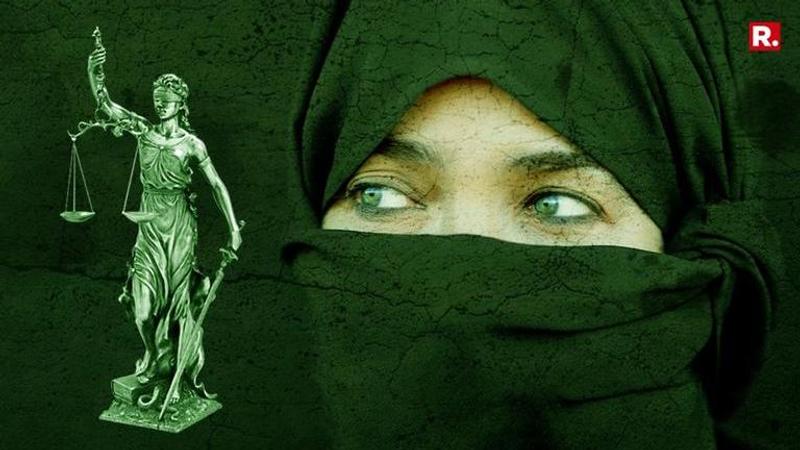Published 19:11 IST, December 27th 2018
Triple Talaq bill passed in Lok Sabha for a second time after Congress stages walkout having been unsuccessful in its Joint Standing Committee demand
After an hours-long heated debate involving virtually every major party, the Lok Sabha on Thursday passed the amended Muslim Women (Protection of Rights on Marriage) Bill, also known as the Triple Talaq bill, with around 238 MPs voting for and about 12 against, with the remaining not present in the house, or like the Congress party, having walked out.

After an hours-long heated debate involving virtually every major party, the Lok Sabha on Thursday passed the amended Muslim Women (Protection of Rights on Marriage) Bill, also known as the Triple Talaq bill, with around 238 MPs voting for and about 12 against, with the remaining not present in the house, or like the Congress party, having walked out.
There were surprises in store even before the debate got underway, as the Congress, which had allowed the earlier version of the bill to pass in the lower house only to block it in the Rajya Sabha, moved a motion seeking to disapprove the Triple Talaq ordinance that had been promulgated by the government in September. The same ordinance lent heavily to the amended bill that was tabled in the house.
READ | Triple Talaq Bill in Parliament LIVE UPDATES: Congress to move motion seeking to disapprove Triple Talaq Ordinance; Issues whip to all MPs to be present
It had been union law minister Ravi Shankar Prasad who had moved the amended Triple Talaq bill in the house, appealing to parties to put aside their politics and come together to empower Muslim women and give them equality. It was a matter of national importance, he said, even as the Congress, led by Mallikarjun Kharge demanded that it be referred to a joint standing committee.
The Congress party, which was first represented in the debate by Sushmita Dev, picked on the maintenance aspect of the bill, arguing that maintenance for the women who had been given triple talaq wasn't adequately defined in the bill. She somewhat bizarrely contrasted this with legislation from the Rajiv Gandhi-era -- something that had been widely panned at the time for not upholding the rights of Muslim women. The Congress' primary grouse with the bill remained its criminalisation aspect, this despite the amended bill having diluted punishment for husbands who are found guilty of giving Triple Talaq.
"You are giving a Muslim woman nothing but a criminal case in place of a Triple Talaq", Sushmita Dev said.
On this, Sushmita Dev was fiercely opposed by Meenakshi Lekhi who argued that the legislation brought forth by Rajiv Gandhi was for appeasement politics and not for empowerment. She asked where Triple Talaq was mentioned in holy scriptures, and put forth that this was not a matter of man vs woman, but about human rights violations. She also argued on the criminality aspect, saying:
"To empower the Supreme Court ruling it was important to bring this Bill. With regards to the criminal aspect of the Bill, we have a provision for bail in it. The intention of the Bill is punitive, restorative and reformative", Meenakshi Lekhi said.
Union Ministers Smriti Irani and Mukhtar Abbas Naqvi spoke before the Law Minister's turn came again.
Irani countered Dev over the 1986 Act and questioned its effectiveness, "If the 1986 legislation was so just, then why did Shayara Banu had to approach the Supreme Court?" the Union Minister said.
Naqvi also slammed the Congress for the 1986 Act and blamed the party for doing appeasement politics.
"Congress made the (1986) law under the influence of fanatics to undermine the Supreme Court," he said.
Following that, representatives from various parties spoke, some for, others against.
AIADMK, RSP, Trinamool Congress, BJD, TDP, TRS, CPI(M), NCP, SP, AAP, AIUDF, AIMIM and RJD were among the parties that opposed. In support of the bill were the Akali Dal, Shiv Sena and JD(U). Undecided were the YSRCP, RLSP, INLD, SDF and a few more.
Before the Lok Sabha went for voting on the Bill, Law Minister Ravi Shankar Prasad addressed the lower house over the objections raised against it.
Over the Opposition's demand for the Bill to be sent to Joint Select Committee, he said:
"Opposition's demand for JSC has possibly only one reason, 'why it is criminalized?' When Parliament has passed bills calling for harsher punishments for other crimes then why no one said what will happen to the families of culprits. He mentioned the law against the Dowry as an example. "Even the Dowry is a non-bailable offence," he said.
He also answered Opposition's allegations that the Bill was targeting a particular community and explained why the government brought the bill.
"If Quran opposed the triple talaq, why would the law support it. We are not targeting any particular community. Between January 2017 and December 2018, 477 triple talaq cases were brought to light in front of us."
He addressed the issue of maintenance and also spoke about the jail-term for those convicted under the Bill if it becomes an Act. "The Bill gives the power to the Magistrate to decide on the maintenance. The Magistrate will also decide on the bail, only after the hearing of the victim."
Following this Mallikarjun Kharge yet again stated the Opposition's reservations against the Bill and demanded that the Bill be sent to a JSC. He also announced that his party will stage a walk out. "Everyone is demanding a JSC. We will walk out," Kharge said.
BJP's ally in the Centre, AIADMK, also staged a walk out.
The bill was then put to a vote again, which it passed. It will now move to the Rajya Sabha.
Updated 00:13 IST, December 28th 2018




